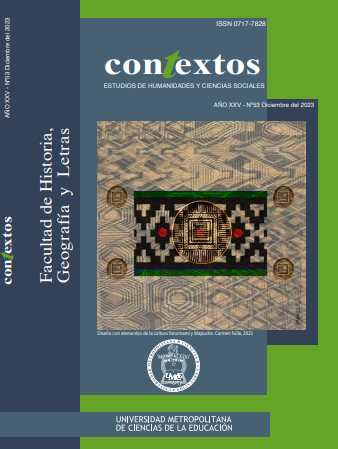Main Article Content
May 17, 2024
Abstract
The article examines how the Crisis magazine (Buenos Aires, 1973-1976) covered the unfolding situation in Chile following the coup d'état on September 11, 1973. Utilizing tools of discourse analysis, the notion of discursive strand is employed to thematically organize the texts published by the magazine regarding the Chilean circumstances. Subsequently, Crisis articles are analyzed as discourses that were actively related both to the Latin American cultural field and the social and political order of their time. Concepts such as commitment, novelty, and memory allow us to analyse the specific manner in which these discourses enabled the magazine to position itself during the tumultuous years of its publication.
Downloads
Policies for open access journals
Authors who publish here accept the following terms: Authors will keep their copyright and will guarantee the journal the right to the first publication of their work, which will be subject to the Licence of Creative Commons acknowledgement, which allows for the use of this material only if the authorship is credited and the original source is acknowledged (the journal’s URL), and if it is not used with commercial ends and with any derivations of the original work.
Authors may adopt other non-exclusive license agreements of distribution of the published version (e.g. to save it onto a digital institutional archive or publish it in a monographic volume) only if the initial publication of this journal is indicated.
It is permitted and recommended for authors to divulge their work on the Internet (e.g. institutional digital archives or webpage) before and during the submission process, which may lead to interesting exchanges and increase the citations of the publication. (See Open Access Effect).
References
Benjamin, W. (2005). Tesis sobre la historia y otros fragmentos. (B. Echeverría, Trad.) México: Contrahistorias.
Beverley, J. (2010). Testimonio: sobre la política de la verdad. México: Bonilla Artigas.
Chile Hoy. (Septiembre de 1973). (65).
Chile: venid a ver la sangre por las calles. (Noviembre de 1973). Ideas, letras, artes en la Crisis(7), 68-72.
De Diego, J. L. (2003). ¿Quién de nosotros escribirá el Facundo? Intelectuales y escritores en Argentina, 1970-1986. La Plata: Ediciones al margen.
Devés Valdés, E. (1989). Los que van a morir te saludan: Historia de una masacre. Escuela Santa María. Iquique, 1907. Santiago: Documentas.
Fishwick, A. (2018). El “socialismo cotidiano” de los trabajadores textiles chilenos: trazando una política radical a través de la prensa obrera, 1936-1973. Astrolabio(21), 53-79.
doi:10.55441/1668.7515.n21
Garcés, M., & Leiva, S. (2005). El golpe en La Legua: los caminos de la historia y la memoria. Santiago: LOM.
García Márquez, G. (Abril de 1974). Chile. Ideas, letras, artes en la Crisis, 68-73.
Gilman, C. (2012). Entre la pluma y el fusil. Debates y dilemas del escritor revolucionario en América Latina. Buenos Aires: Siglo XXI.
Grez Toso, S. (Diciembre de 2007). Matanza de la escuela Santa María de Iquique. Le Monde Diplomatique (edición chilena). Obtenido de https://www.lemondediplomatique.cl/2007/12/matanza-de-la-escuela-santa-maria-de-iquique.html
Ideas, letras, artes en la Crisis. (Octubre de 1973). (6).
Informe sobre Chile: esperanza, crimen y caída. (Octubre de 1973). Ideas, letras, artes en la Crisis(6), 64-72.
La canción póstuma de Víctor Jara. (Enero de 1974). Ideas, letras, artes en la Crisis(9), 32.
Lafforgue, J. (Septiembre de 1973). Jorge Amado: Acontece que soy bahiano. Ideas, letras, artes en la Crisis(5), 36-37.
Marchesi, A. (2019). Hacer la revolución: Guerrillas latinoamericanas, de los años sesenta a la caída del Muro. Buenos Aires: Siglo XXI.
Mate, R. (2006). Medianoche en la historia. Comentarios a las tesis de Walter Benjamin “Sobre el concepto de historia”. Madrid: Trotta.
Monsálvez Araneda, D., & Máximo Nascimento, M. (2022). El intelectual durante la Unidad Popular, un análisis a través de las revistas Chile Hoy, La Quinta Rueda y Punto Final. Cuadernos de historia(56), 39-63. doi:10.5354/0719-1243.2022.67225
Montali, G. (2015). Los que dijeron no. El debate sobre la posibilidad de una literatura revolucionaria en la revista Crisis (1973/1976). XI Jornadas de Sociología. Buenos Aires: Facultad de Ciencias Sociales, Universidad de Buenos Aires. Obtenido de https://www.aacademica.org/000-061/219
Ponza, P. (enero-junio de 2020). Revistas, redes intelectuales y zonas de incitación teórica. Palimpsesto, 10(17), 24-38. doi:10.35588/pa.v10i17.4306
Sarlo, B. (1992). Intelectuales y revistas: razones de una práctica. América: Cahiers du CRICCAL(9-10), 9-16. doi:10.3406/ameri.1992.1047
Sonderéguer, M. (2008). Revista Crisis (1973-1976). Antología: del intelectual comprometido al intelectual revolucionario. Bernal: Universidad Nacional de Quilmes.
Tarcus, H. (2020). Las revistas culturales latinoamericanas. Giro material, tramas intelectuales y redes revisteriles. Buenos Aires: Tren en Movimiento.
Traverso, E. (2022). Revolución. Una historia intelectual. Buenos Aires: Fondo de Cultura Económica.
Welschinger Lascano, N. S. (2009). El hiato de la cultura. Intelectual y sectores populares, persistencias y variaciones de una relación problemática. La experiencia de la revista “Ideas, letras y arte en la Crisis” (1973/1976). Question, 1(23). Obtenido de https://perio.unlp.edu.ar/ojs/index.php/question/article/view/816
Wodak, R., & Meyer, M. (2003). Métodos de análisis crítico del discurso. Barcelona: Gedisa.






